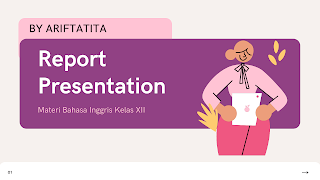1. Proverb
Every culture has a
collection of wise sayings that offer advice about how to live your life. These
sayings are called by "proverbs".
Example: Time is money =
Waktu adalah uang.
(Waktu sangat berharga atau penting maka manusia harus menggunakan waktu
sebaik mungkin)
Kinds
of Proverbs:
1. Aphorism (Pepatah)
This
proverb offers advice.
Example
: Don’t go too far in small.
(Persoalan kecil jangan dibesar-besarkan).
2. Parable (Perumpamaan)
That
has a moral lesson and has parable.
Example : To
carry coals to New-castle.
(Bagai
membuang garam kelaut)
3. Slogan (Pameo)
This
proverb gives spirit or motivation.
Example :
1.
Early
bird gets worm
(Tuhan akan memberikan rezeki kepada
makhluk-Nya yang lebih dulu bangun)
2.
Diligence
is the mistress of success.
(Kerajinan pangkal kesuksesan)
4. Idiom
It
is a phrase that has group of words with a different meaning from the meaning of
all the individual word.
Example
:
1.
Pull
your sock up. (improve your
behaviour)
2.
You
can arrange your bedroom at will. (sesuka
hati)
3.
Don’t
mention it. (You’re welcome)
Task 1
What
does it mean?
1.
Better
late than never.
2.
Don’t
go too far in small.
3.
By
learning to obey we know to command.
4.
A friend in need is a friend indeed.
5.
Actions
speak louder than words.
Work in Group.
Work
in group and find the meaning of following proverb that is in film.
1.
It’s
not what is outside but what in inside that count. (Aladdin)
2.
Always
let your conscience be your guide. (Pinokio)
3.
It’s
doesn’t matter. It’s in the past. The past can hurt. But the way I see it, you
can either run from it, or learn from it.
Individual work
1.
Find
5 proverbs and the meaning!
Pedoman Penilaian Task 1
Soal
berbentuk uraian. Jawaban benar skor 20, jawaban kurang tepat skor 10, jawaban
salah skor 0
2. Riddle
A riddle is a type of poetry that describes something
without actually naming what it is, leaving the reader to guess. It is a light
hearted type of poetry which involves the reader.
Riddles can be about anything, from riddles
about animals to riddles about objects. There are no rules on how to structure
a riddle poem, a riddle can be funny or it can rhyme, it depends on the person writing the riddle.
Example:
1.
It’s an animal. It’s an orange black. It has
stripes. It has four paws. It lives in the jungle. What is it?
It is a Lion.
2.
“Three eyes
have I, all in a row; when the red one opens, all freeze.” The answer is traffic light.
3.
Example of
Rhyming Riddle
I come in different style.
I can help you walk for miles.
Come in pair.
I’m somethiing what you wear.
With heals I’m glam
Can you guest what I am?
I am a ..
Exercise.
Match
and Find the answer of the following riddle.
|
1. What building has the
most stories?
2.
What is
broken every time it’s spoken?
3.
What four
letter word can be read upside down, downside up, and up to down?
4.
What
animal walks on all fours in the morning, two in the afternoon and three in
the evening?”
5.
What
falls, but does not break, and what breaks but does not fall?
6.
I have
holes in my top and bottom, my left and right, and in the middle. But I still
hold water. What am I?
7.
What can
run but never walks, has a mouth but never talks, has a head but never weeps,
has a bed but never sleeps?
8.
I never
was, am always to be.
No one ever saw me, nor ever will.
And yet I am the confidence of all.
To live and breathe on this terrestrial ball.
What am I?
9.
I am the
black child of a white father, a wingless bird, flying even to the clouds of
heaven. I give birth to tears of mourning in pupils that meet me, even though
there is no cause for grief, and at once on my birth I am dissolved into air.
What am I?
10.
Pronounced
as one letter. And written with three. Two letters there are. And two only in
me. I'm double, I'm single. I'm black, blue, and grey. I'm read from both
ends. And the same either way. What am I?
Written by: Arifta Lantita Jinggaa (@ariftatita)
|
a.
An eye.
b.
Smoke
c.
Tomorrow
d.
Night
falls and day breaks.
e.
A river.
f.
A man,
since he crawls as a child then walks and uses a cane when he gets older.
g.
library
h.
A sponge
i.
silence
j.
N O O N
|








